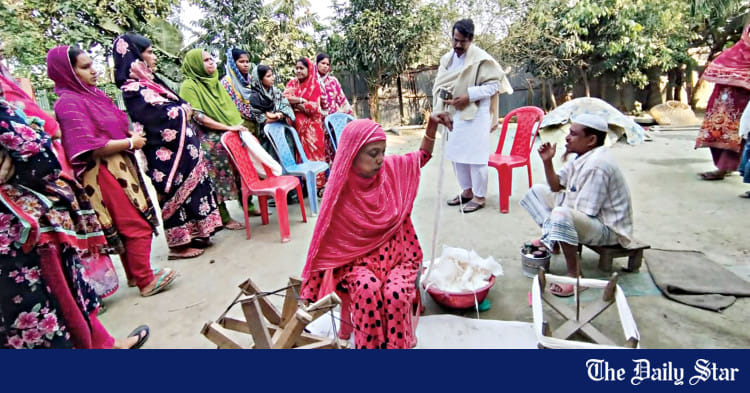Saif
Senior Member
- Joined
- Jan 24, 2024
- Messages
- 15,397
- Reaction score
- 7,874
- Nation

- Residence

- Axis Group

Cottage industries seek govt support to overcome challenges
Entrepreneurs in the cottage industries sought proper support from the government to help flourish in the sector, overcoming challenges created by the Covid-19 pandemic.
They were speaking on Tuesday at a national workshop titled 'From Challenges to Creativity and Innovation: Enhancing CMSME's Resilience in the Context of Covid-19' and prize-giving ceremony to the winners of Food Frontiers 2021.
National Association of Small and Cottage Industries of Bangladesh (NASCIB) and the Global Alliance for Improved Nutrition (GAIN) jointly organised the event at a city hotel.
NASCIB President Mirza Nurul Ghani Shovon chaired the programme while Jo Jacobsen, programme, policy advisor, nutrition, gender and M&E of World Food Programme, and Dr Rudaba Khondker, country director, GAIN Bangladesh were present as special guests.
Md Monjurul Hoque, the former chief faculty member of Small and Cottage Industries Training Institute (SCITI) of BSCIC, presented a PowerPoint on the issues.
According to the power point, about 25 per cent of the industries under the cottage, micro, small and medium enterprises (CMSME) sector were shut in the first five months of the Covid-19 pandemic.
It also showed that 60 percent of industries incurred 75 losses in selling products, and 58 entrepreneurs lost capacity of investments because of the impact of the pandemic.
Around 34 per cent of entrepreneurs could not pay rents of their institutions, while 16 per cent failed to pay salaries of their staff. Besides, 29 per cent of institutions could provide 50 per cent of the dues of their staff.
The marketing of products was hampered as the income of the majority of people declined due to the prolonged coronavirus pandemic.
The production costs increased in many cases because of the higher prices of raw materials. For these reasons, local products fail to compete with the imported ones, it said.
Entrepreneurs also faced complexities in receiving funds from stimulus packages that were provided for Covid-19 impacted sectors. They also said small and cottage food industries faced challenges due to the restriction on movements of customers during the period.
They also identified problems like the unavailability of technologies in the food sector. They suggested providing one-stop services and simplifying the process of registration and rationalising tax and tariff systems.
However, three business institutions have been awarded in different categories in the programme.
Ghost Kitchen Bangladesh won first prize of US$ 9,000 for improving the production efficiency of restaurants and commercial kitchens.
The first-ever nutrition-dense raw cashew nut processing solution to ensure nutrition for local and global markets, Green Grain won the second prize of US$ 6,700.
With the technological solution to understand the soil and market scientifically to ensure fair price for the farmers, iPAGE won the third prize of US$ 4,300 under the infrastructural grant support category.
They were speaking on Tuesday at a national workshop titled 'From Challenges to Creativity and Innovation: Enhancing CMSME's Resilience in the Context of Covid-19' and prize-giving ceremony to the winners of Food Frontiers 2021.
National Association of Small and Cottage Industries of Bangladesh (NASCIB) and the Global Alliance for Improved Nutrition (GAIN) jointly organised the event at a city hotel.
NASCIB President Mirza Nurul Ghani Shovon chaired the programme while Jo Jacobsen, programme, policy advisor, nutrition, gender and M&E of World Food Programme, and Dr Rudaba Khondker, country director, GAIN Bangladesh were present as special guests.
Md Monjurul Hoque, the former chief faculty member of Small and Cottage Industries Training Institute (SCITI) of BSCIC, presented a PowerPoint on the issues.
According to the power point, about 25 per cent of the industries under the cottage, micro, small and medium enterprises (CMSME) sector were shut in the first five months of the Covid-19 pandemic.
It also showed that 60 percent of industries incurred 75 losses in selling products, and 58 entrepreneurs lost capacity of investments because of the impact of the pandemic.
Around 34 per cent of entrepreneurs could not pay rents of their institutions, while 16 per cent failed to pay salaries of their staff. Besides, 29 per cent of institutions could provide 50 per cent of the dues of their staff.
The marketing of products was hampered as the income of the majority of people declined due to the prolonged coronavirus pandemic.
The production costs increased in many cases because of the higher prices of raw materials. For these reasons, local products fail to compete with the imported ones, it said.
Entrepreneurs also faced complexities in receiving funds from stimulus packages that were provided for Covid-19 impacted sectors. They also said small and cottage food industries faced challenges due to the restriction on movements of customers during the period.
They also identified problems like the unavailability of technologies in the food sector. They suggested providing one-stop services and simplifying the process of registration and rationalising tax and tariff systems.
However, three business institutions have been awarded in different categories in the programme.
Ghost Kitchen Bangladesh won first prize of US$ 9,000 for improving the production efficiency of restaurants and commercial kitchens.
The first-ever nutrition-dense raw cashew nut processing solution to ensure nutrition for local and global markets, Green Grain won the second prize of US$ 6,700.
With the technological solution to understand the soil and market scientifically to ensure fair price for the farmers, iPAGE won the third prize of US$ 4,300 under the infrastructural grant support category.







